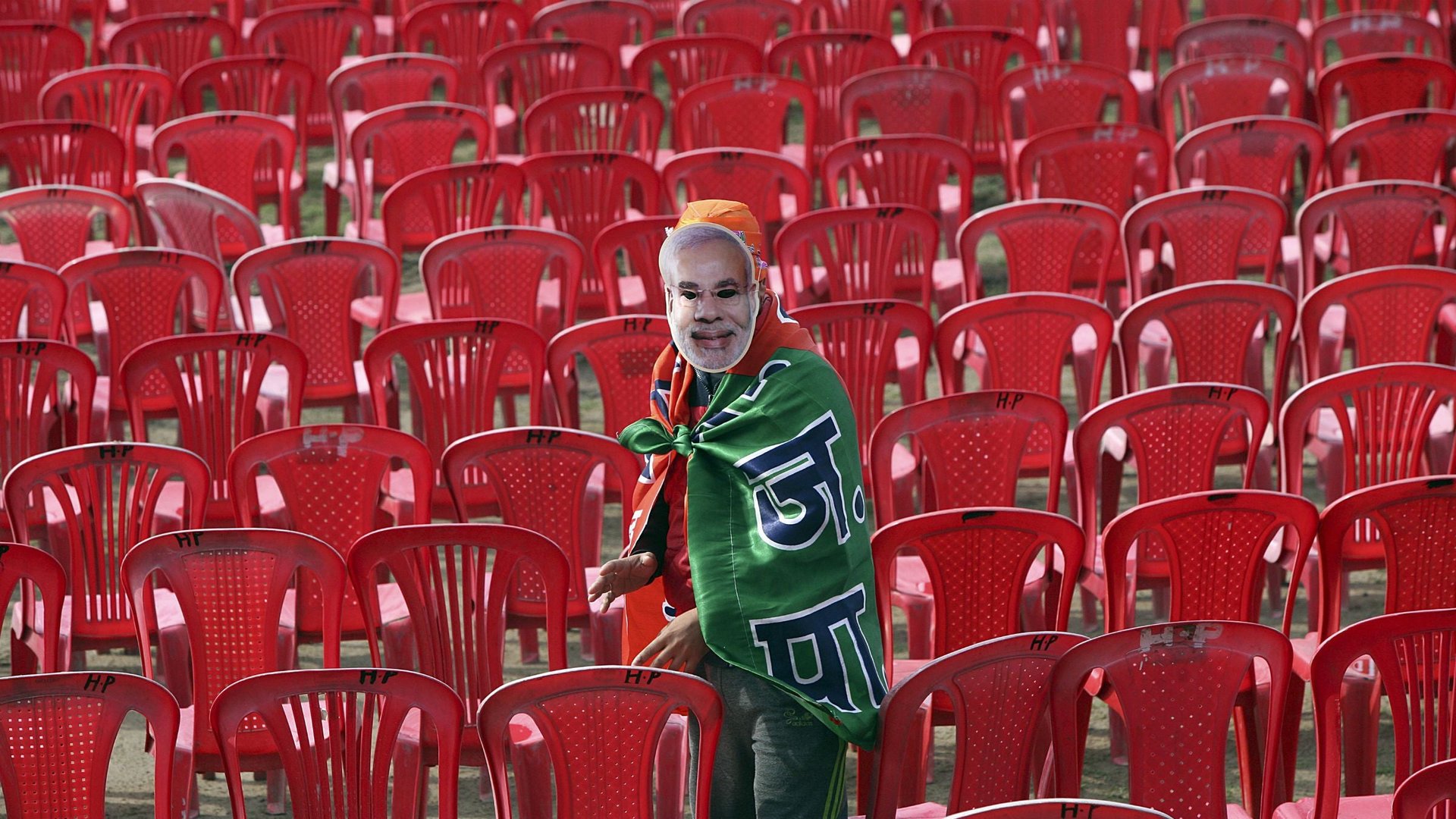Narendra Modi’s first television interview was more like a monologue
He actually said nothing.


He actually said nothing.
In his first television appearance before India’s elections, Narendra Modi acknowledged no lapses in his leadership when state authorities failed to stop the killing of Muslims by Hindu mobs.
Modi, serving a third term as chief minister of Gujarat, is the popular prime minister candidate for the Bhartiya Janata Party (BJP). Supporters hail him as a messiah of development or as protector of Hindu interests, or both.
On Monday and Tuesday, the News X channel promised to air “Modi on the 2002 riots and if he thinks he did enough to stop them.” In the end, it failed to deliver.
Instead of fielding tough questions from a journalist, Modi indulged in monologue of his itinerary on Feb. 27, 2002. That’s the day a train compartment was attacked by a Muslim mob in the town of Godhra. More than 50 Hindus were killed, which in turn sparked retaliatory religious violence against Muslims.
Speaking in Hindi, Modi said that he rushed to Godhra in a helicopter with one engine and asked police to be vigilant and for the army to be deployed, but the troopers were in Jodhpur, a city in neighboring Rajasthan state.
“I said that even they would be having barbers and washermen. Make them wear the uniforms and take them around,” he said. “Even that would have the impact.”
A Supreme Court-authorized investigation cleared Modi of any wrongdoing in 2012, and he also was absolved by a local court in Gujarat last year. (In a biography of Modi by author Andy Marino, the chief minister is quoted as saying, “I feel sad about what happened but no guilt. And no court has come even close to establishing it.”)
In its 2002 April report, Human Rights Watch, said that panicked calls made to police stations in Gujarat received the responses such as: “We don’t have any orders to save you” and “We cannot help you, we have orders from above.”
While legally in the clear, Modi can’t escape the ghosts of the riot and the lingering shadows of doubts unless he clearly confronts why the state machinery failed to prevent the death of more than 1,000 people, mostly Muslims, with killings, rape, and looting continuing for three days after the train burning, under his watch.
And that’s why the interview on News X—one of literally dozens of 24-hour news channels covering the minutiae of this historic election—was so important. It was publicized as the politician’s first interview of the election season. And yet the whole thing was more like a monologue, hardly in response to or an exchange with an independent reporter.
His musings were part of the documentary research of academic Madhu Kishwar, author of Modi, Muslims and Media. Kishwar said that Modi should be celebrated and not demonized, pointing out that the politician had never delivered any hate speech.
Since Saturday, the news channel has aired four episodes of Modi’s trip down memory lane, all the while bypassing some big potholes. In the latest interview, aired today, he said mobs had outnumbered the police and that peace was restored within 72 hours. He went so far as to say Gujarat’s handling of the violent situation should be a model for the rest of the country.
“What happened in Gujarat could have happened anywhere,” he said. Modi went on to say that he offered to resign after the riots, but senior leaders in the BJP asked him to reconsider, some saying the resignation could worsen the situation in BJP.
Modi said that he again offered to resign to the prime minister, who agreed to dissolving the cabinet, but the election commission did not allow for new elections. Modi says he then asked the Supreme Court for an independent investigation.
Modi’s supporters generally dismiss the criticism around the 2002 violence saying a handful of biased intellectuals and activists have not subjected the Congress Party to a similar degree of accountability for the massacre of at least 3,000 Sikhs in 1984.
In January, Congress Party vice president Rahul Gandhi (the other unofficial prime minister candidate) also appeared on national television. Notably, neither he nor Modi offered solace to the families of victims of the riots (Hindu and Muslim and Sikh), and neither particularly threw his weight behind preserving the secular character of India.
While Modi may mock Gandhi as the prince of privilege, at least the Congress leader’s inadequate response to the 1984 killings were made to a tough interviewer before national television, which was followed by much mockery from media and the public.
But in avoiding the tough questions, Modi is masking deficiencies such as recent infighting within his own political party over candidates as well as painful episodes of the past. And even if he becomes prime minister, which is looking increasingly likely, the deflection of those questions will continue to haunt him.